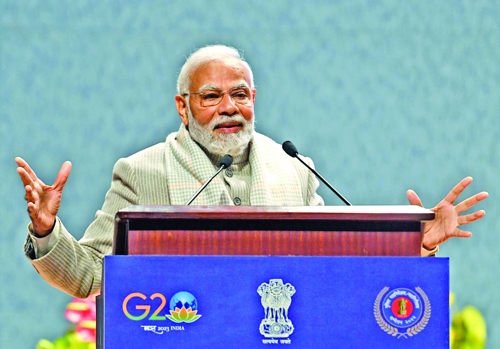DGPs’ meet: PM seeks enhanced cooperation between state police, central agencies

STATE TIMES NEWS
New Delhi: Prime Minister Narendra Modi on Sunday sought more cooperation between state police forces and central agencies to leverage capabilities, and stressed on enhancing traditional mechanisms of policing such as foot patrols along with adopting technological solutions.
Addressing the 57th All India Conference of Director Generals and Inspector Generals of Police here, he also recommended repealing obsolete criminal laws and building standards for police organisations across states.
The prime minister stressed on enhanced cooperation between state police and central agencies to leverage capabilities and share best practices, according to an official statement.
He also discussed “strengthening the border as well as coastal security by organising frequent visits of officials”, it said.
Modi also said that police forces should be made more sensitive and trained in emerging technologies, and underscored the importance of the National Data Governance Framework for smoothening data exchange across agencies.
He suggested that while police forces should further leverage technological solutions such as biometrics, there is also a need to further strengthen traditional policing mechanisms such as foot patrols.
Modi also favoured prison reforms to improve jail management.
The prime minister called for replicating the model of DGP-IGP conferences at the state and district levels for discussing emerging challenges and evolving best practices among their teams.
The conference covered various aspects of policing and national security, including counterterrorism, counterinsurgency and cybersecurity.
Union Home Minister Amit Shah and National Security Adviser Ajit Doval attended the three-day meet which began on January 20. Around 600 officers of various levels attended the conference in hybrid mode from states and union territories.
“Since 2014, Modi has taken a keen interest in the DGPs’ conference. Unlike the symbolic presence of prime ministers earlier, he sits through all major sessions of the conference,” a statement from the Prime Minister’s Office had earlier said.
It had also said that the prime minister not only listens patiently to all the inputs, but also encourages free and informal discussions so that new ideas can come up.
This provides a congenial atmosphere for the top police officials of the country to directly brief the prime minister on key policing and internal security issues, and give open and frank recommendations, the statement had said.
Guided by the vision of the prime minister, the conference started discussions on futuristic themes in policing and security, an official said.
Topics such as security challenges along the land borders with Nepal and Myanmar, strategies to identify overstaying foreigners in India and targeting of Maoist strongholds were discussed at the three-day meet.
Modi also distributed Police Medals for Distinguished Services.
Till 2013, the annual meet was held in New Delhi. The next year, when the Modi government came to power, it was decided to hold the event, organised by the Ministry of Home Affairs and Intelligence Bureau, outside the national capital.
It was held in Guwahati in 2014, Rann of Kutch in 2015, the National Police Academy in Hyderabad in 2016, the BSF academy at Tekanpur in 2017, Pune in 2019 and virtually during the Covid pandemic in 2020 and in Lucknow in hybrid mode in 2021.
This time, the conference was held at the Indian Agricultural Research Institute in Delhi’s Pusa. Earlier, the venue for the meet in the national capital used to be the Vigyan Bhavan.
The number of business sessions and topics have increased significantly with a focus on improving policing in service of the people, the official said.
Before 2014, deliberations largely focused on national security matters only. Since 2014, these conferences have a twin focus on national security as well as core policing issues, including prevention and detection of crime, community policing, law and order, improving the police’s image, the official said.
Direct interaction of the police top brass with the head of government has also resulted in a convergence of views on crucial challenges faced by the country and the emergence of doable recommendations, the official said.
In the past few years, the topics are being selected for the conference after detailed discussions with the highest echelons of the police service.
Once selected, several interactions on presentations are held before committees of director generals to encourage participation and to incorporate ideas from the field and from young officers, the official said.
The result is that all presentations are now broad-based, content-intensive and carry a set of cogent and actionable recommendations, according to the official.
Since 2015, detailed follow-up of recommendations of past conferences has been the norm and is the topic of the first business session.
Recommendations are tracked closely by the conference secretariat, led by the Intelligence Bureau, with the help of nodal officers of states.
Decisions made in the past few conferences led to significant policy changes leading to improvement of policing in the country, including setting higher standards for effective policing in rural and urban areas, and improved methods of modern policing, based on smart parameters, the official said.
